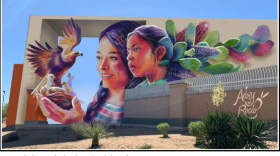Las Vegas-based Iranian artists Ali Fathollahi and Nanda Sharifpour landed in Istanbul, Turkey, the day before the terrorist attacks at Ataturk Airport this summer, finding themselves once again in a heightened political landscape where violence shakes and defines reality.
As jarring as it was, it was familiar terrain for Fathollahi, who’d spent six months of his childhood living in an underground shelter in Tehran with his sister and parents, attempting to survive Saddam Hussein’s missile attacks during the Iran-Iraq war, an experience that plays out in his solo exhibit, Adolescence, on view through September 24 at Sin City Gallery.
Here, Fathollahi’s memories and nightmares are told in narratives packaged in surrealist assemblages and collage works, and overt symbolism lives in every piece.
Born in 1979, the year of the Iranian Revolution, Fathollahi lived through Iran’s eight-year war with Iraq. Adolescence is the artist’s boyhood story, in which hiding in a 10-foot by 8-foot underground room — the size of a small bedroom — reveals all, even the forbidden. Especially in a religious country where so much is taboo, including the sight of his mother’s undergarments hung on the wall to dry.
"Everyone tried to not go out," he recalls. "The bombing might happen anytime. My mother cooked and washed in the bunker. We had to turn lights off so they can't see your safe place. We had TV for school. It was so scary, but at the same time, interesting."
A bombing video projected on a boy's white T-shirt, made stiff through plaster and hanging on a plaster-covered wire hanger, represents the way his father quickly plastered the dirty cement walls of the former storage space. The cherub above represents hopes and dreams. In this piece, it’s broken. Below the T-shirt hangs illustrated flowers in resin, referencing a game he made by using sheets of plexiglass covered with imagery to make projections on a wall using candlelight, an interestingly Platonic experience for someone weighing reality.
In "Spin," a plaster cast of his teeth juts out from a wooden wall piece. Resting in the bite is a spoon with a die showing three numbers: 32, representing his age when he came to the United States; 8, his age when he was in the shelter and 4, which represents how many years he and his wife, Nanda, have been in the U.S. Illustrated fish, symbolic of the guardians of life, swim around the teeth. Directly above is a found black-and-white image of a boy, representing Fathollahi and "all the sadness." The enlarged eyes and monocles flanking the boy denote being watched — by the government, parents and society. Illustrated flowers hold the image together.
While the ostrich feathers jutting from a plaster piece featuring a woman's brassiere filled with marbles could seem to reference a Las Vegas showgirl, the juxtaposition of feathers (used in religious ceremonies) and women's undergarments is more telling — religion and sin.
Now an MFA candidate at UNLV, along with Sharifpour, with whom he fled Iran for Turkey in 2008, Fathollahi studied illustration, graphic art and fine art at the Azad University, Tehran. He used to write and perform in small underground groups, but in the United States language was a barrier, so his work turned to assemblages, a more universal language.
"He could have not had this show in Iran,” says Sin City Gallery Owner Laura Henkel. “This would have been censored.”
In America, adolescence refers to one’s teenage years, but for Fathollahi, who had his first girlfriend while in hiding, Adolescence references childhood and the returning idea of adolescence with the changing of each country.
"I'm not a sad person," he says. "I just try to remember and re-create everything."
Ali Fathollahi: Adolescence
Through September 24, Sin City Gallery, 107 E. Charleston Blvd., 702-608-2461.






